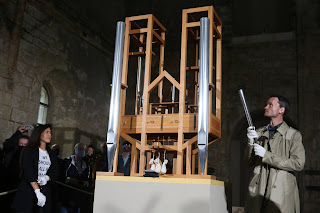On September 5, 2020 at the St. Burchardi Church in Halberstadt, Germany, a throng of musical enthusiasts and fans of things “off the beaten path” assembled in the basement to hear a piece of music.
A tiny piece in the grand scale of time. (See and hear it here)
American composer and avante garde’ artist John Cage, toward the end of his long and distinguished life, set in motion a piece of music called “ORGAN/ASLSP” which uncoded is, “Organ As Slow As Possible.”
Cage and his cohorts used the church basement to construct an organ that is perpetually emitting music using an energy generating compressor and sand bags. On September 5, 2001, Cage’s 89th birthday, the opus began…with a 17 month pause of silence followed by the first chord which lasted another 29 months.
You see, Cage has fashioned this 8-page musical art show to last 639 years. (That is not a typo!) And so, just a few weeks ago, many of Cage’s musical fandom paid close attention as the first chord change in six years and eleven months took place among the masked and curious in the right transept of the hallowed grounds as two organ pipes were added and will play G♯3, E4 the next 17 months until the next chord change in February of 2022.
Board chairman of Halberstadt’s John Cage Organ Foundation, Rainer Neugebauer, says the performance is composed to make us slow down the frenzy of our modern lives. “Everything does not need to happen so fast. If something needs a bit longer then it can give us an inner calm that is rare in normal life.”
Society, as we all know, has become instant. Your phone can give you directions, answers, human screen contact and most any and all modern conveniences in seconds. We get annoyed when the internet on a plane runs a bit slow even though you are travelling 600 mph at 37,000 feet above the planet. Those complexities don't enter into our mind- we want things NOW!
Sadly, coaching is trending this way as well. Coaches who have rough starts to the season are suddenly on the chopping block. Players who struggle to assimilate with new teams and new teammates are chastised for not being ready to play. And young athletes that have yet to grow into their physical potential as pre-teens are cut and run off from sports they may one day excel in because they are not good enough in this moment!
Patience has almost become an antithesis of sports performance. As a youth sports culture, we have been driven to the idea that winning is above learning, that learning must show dividends in THIS DRILL and starting your sport at 6 or 7 years old and being fixed on just one position will put the patience science says it takes to develop an elite performer, at bay.
Ask someone who has been called an overnight sensation and ask them how real that statement is? Ask someone who comes off the bench in the upcoming NBA finals and has a stellar game if this new found fame just happened?
Like a $100 bill from our pocket, we have lost our patience as fans, as parents and as coaches.
One coach was overheard last week after a practice saying, “They look better!” If we are coaching to look better at a practice, we are missing the ideas of transfer and retention. An athlete can look amazing at the end of practice on Tuesday, but what about next Tuesday? Have they retained and transferred to their game what you taught them? Have they learned?
Some athletes maybe, some others maybe not. Welcome to coaching. But if a new coach thinks change comes at an instant; they are being fooled as much as the click bait below their daily horoscope or Starbucks coupon. Learning takes patience, change takes patience. And as coaches, we need to show players that patience.
John Cage set out to give humanity something to ponder; music that will outlast all of us (probably) and our next 10 generations. On September 5, 2640, maybe one of your descendants might happen upon a small church basement in Halberstadt, Germany, if it is still standing, and marvel about what life must have been like in the olden days of 2020 as the final note sounds, finishing the work.
Auguste Rodin once said, “Patience is also a form of action.” For Coaches today, our work is never finished. There is always more to teach, lessons to be learned, new research to explore and implement. But this all takes time and patience.
Your athletes deserve your patience just like the patience you want your children’s school and teachers to show them.
Perhaps, Maya Angelou sums it up best. “All great achievements require time.”
Who is your next great achievement?


